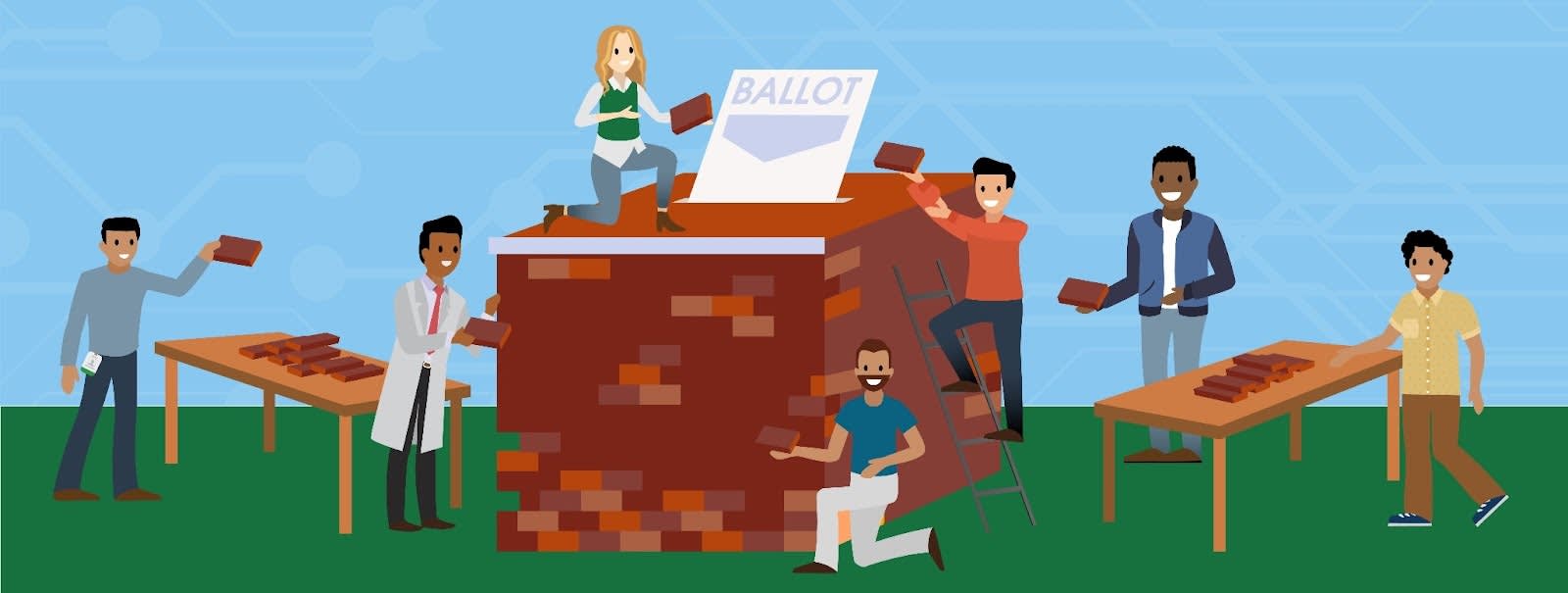Strengthen Election Security
Learning Objectives
After completing this unit, you’ll be able to:
- Explore various roles and responsibilities in promoting secure and free elections.
- Discover strategies to enhance digital security during elections.
In the complex world of elections, the responsibility for promoting security and freedom extends beyond just governments, electoral bodies, and policymakers. It’s a shared duty that encompasses all of us, regardless of our roles—whether we’re political candidates, registered voters, campaign team members, community members, or business leaders.
However, before diving into how each of us can positively influence the security of election processes in our respective capacities, let’s first take a moment to revisit and reflect upon the content covered in the previous unit.
Knowledge Check
Ready to review what you’ve learned? The knowledge check below isn’t scored--it’s just an easy way to quiz yourself. To get started, drag the election vulnerability category in the left column next to the matching risk description on the right. When you finish matching all the items, click Submit to check your work and Reset to try again.
Call to Action
Each of us, in one or more of our roles, holds a certain degree of influence in shaping a free and secure election process, both locally and globally. The actions we take, the principles we uphold, and the awareness we spread can significantly impact the integrity of elections.
The tactics and tools presented below represent best practices that are widely recognized and applied in various countries. However, it’s important to note that their application and priority may differ based on each nation's unique political, cultural, social, technological, and legal context.
Let’s delve into how individuals in different roles around the globe can actively contribute to building and maintaining a fair and secure election process.
Role |
Actions |
Tools and Resources |
|---|---|---|
Political candidate |
|
Secure election website (for example, Cloudflare for Campaigns) Cybersecurity training platforms (for example, Cybrary, Coursera’s Cybersecurity courses) Secure communication tools (for example, Jitsi Meet, Tutanota) Transparency networks (for example, OpenSecrets, Transparency International’s Advocacy) |
Campaign team member |
|
Encrypted communication apps (for example, Signal, Wire) Data protection software (for example, OpenPGP). Social media verification services (for example, Instagram verification process) |
Election official |
|
Training resources (for example, Self-Paced Cybersecurity Training for Election Officials) Election toolkits (for example, GCA Cybersecurity Toolkit for Elections |
Registered voter |
|
Official government websites for voter registration (that is, USA.gov, Gov.uk) Fact-checking websites (for example, Snopes, FactCheck.org) |
Community member/ Non-registered voter |
|
Digital literacy tools (for example, Mozilla’s Web Literacy) Reporting tools (for example, econsumer.gov) |
Nonprofit/NGO leaders |
|
Campaign training materials (for example, Cybersecurity Campaign Playbook) Risk assessment tools (for example, CISA’s election security risk profile tool) |
Tech Industry leaders |
|
Secure voting system technologies (like Microsoft’s ElectionGuard) Resources from the Global Network Initiative. |

Regardless of our location in the world, our collective efforts across a variety of roles are crucial in reinforcing the security of the election process. By actively participating and using these approaches, we contribute significantly to strengthening local and global electoral systems, making them jointly resilient against vulnerabilities and attacks.
The Future of Secure Global Elections
In our increasingly digital world and complex geopolitical landscape, the protection of elections from challenges such as geopolitical instability and the emergence of technologies including AI, quantum mechanics, and blockchain is of paramount importance. These technological advancements offer potential for improved security and transparency. However, they also introduce complexities in their implementation and management like the challenge organizations face in ensuring AI systems are consistently ethical, secure, and effective or the challenges in implementing quantum encryption on a large scale.
They could also introduce vulnerabilities, such as AI being used by malicious actors for deep fakes that manipulate voter perceptions, or quantum computing potentially being used to break traditional cryptographic safeguards on election systems.
The key challenge lies in effectively using these technologies to bolster the integrity of the election process while managing risks such as unauthorized access, tampering, and interference. This is about more than just securing technology. It’s about engaging in a unified effort to preserve democratic values and ensure the accurate representation of every voice.
This commitment highlights our collective effort toward achieving a future that is not only secure and transparent but also genuinely democratic.
Sum It Up
In this module, you explored historic trends of the global election process and delved into current security challenges and the strategies to mitigate them. You also gained insights into how various roles, from citizens to political leaders worldwide, can contribute to a more free and secure election process.
Interested in learning more about cybersecurity roles and hearing from security professionals? Check out the Cybersecurity Career Path on Trailhead.